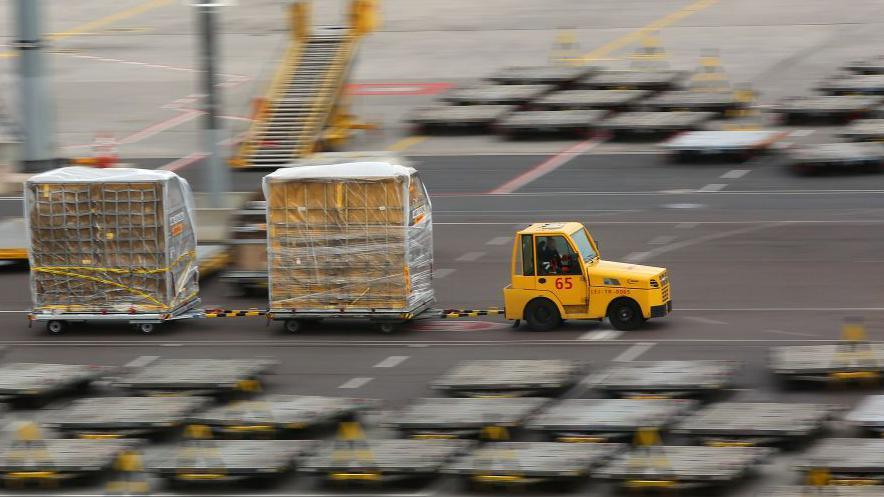Mystery fires were Russian 'test runs' to target cargo flights to US

Germany's domestic intelligence says it was a stroke of fortune that a device in Leipzig had not ignited in mid-air (file pic)
- Published
A series of parcel fires targeting courier companies in Poland, Germany and the UK were dry runs aimed at sabotaging flights to the US and Canada, Polish prosecutors say.
Katarzyna Calow-Jaszewska revealed late last month that four people had been arrested and authorities across Europe were investigating the incidents.
Western security officials have now told US media they believe the fires - which happened in July - were part of an orchestrated campaign by Russia’s military intelligence agency, the GRU.
Russia denies being behind acts of sabotage. But it is suspected to have been behind other attacks on warehouses and railway networks in EU member states this year, including in Sweden and in the Czech Republic.
Ms Calow-Jaszewska said in a statement that a group of foreign intelligence saboteurs had been involved in sending parcels containing hidden explosives and dangerous materials via courier companies. The parcels then spontaneously burst into flames or blew up.
Western officials believe the fires originated in electric massage machines containing a "magnesium-based" substance.
Magnesium-based fires are hard to put out, especially on board a plane.
“The group’s goal was also to test the transfer channel for such parcels, which were ultimately to be sent to the United States of America and Canada,” Ms Calow-Jaszewska said.
Some of the devices originated in Lithuania, and prosecutor general Nida Grunskiene said there had been arrests there too. A pre-trial investigation was under way and law enforcement agencies from other countries were taking part, she told reporters.
On three days in July, fires broke out in a container due to be loaded on to a DHL cargo plane in the German city of Leipzig, at a transport company near Warsaw, and at Minworth near Birmingham, UK, involving a package described as an incendiary device.
The incident at Jablonow near Warsaw took two hours to extinguish, according to Polish reports.
UK officials have given few details about the fire at Midpoint Way in Minworth on 22 July. A Met Police spokesperson confirmed that a counter-terrorism investigation was under way after a package at a commercial premises caught alight, adding that "it was dealt with by staff and the local fire brigade".
Ken McCallum, head of the UK's domestic intelligence agency MI5, said last month that Russian secret agents had carried out "arson, sabotage and more. Dangerous actions conducted with increasing recklessness" after the UK had helped Ukraine in Russia's war. His allegations were flatly rejected by the Kremlin.
A spokesperson for the US Transportation Security Administration said in recent months they have put in place additional security measures for certain US-bound cargo flown in by US and foreign airlines.
A US government official also added that there is no current active threat targeting US-bound flights.
Russia on mission to cause mayhem on UK streets, warns MI5
- Published8 October 2024
It is important to separate the known facts from the allegations being made and suspicions voiced by Western officials.
What is beyond doubt is that this year has seen a succession of suspicious fires at cargo depots in the UK, Germany and Poland - suspicious enough to trigger investigations by counter-terrorism police.
There have been other incidents across Europe and last month a man was convicted at the Old Bailey under the new National Security Act for an arson attack on a Ukrainian-owned business in Leyton, east London in March.
In Germany, the head of the domestic intelligence agency (BfV) has said it was only by a stroke of fortune that the Leipzig device had not ignited in mid-air.
BfV head Thomas Haldenwang has described the device that caught fire at DHL's logistics hub at Leipzig-Halle airport as suspected Russian sabotage.
Taken together, these events are leading Western governments to conclude there is a strong possibility that Russia’s GRU military intelligence agency has embarked on a systematic campaign of anonymous, covert attacks on those countries helping Ukraine.
The package that burst into flames in Leipzig is thought to have arrived from Lithuania and its onward flight was delayed.
The device that caught fire in Minworth is also understood to have come from Lithuania, where the head of the parliament's national security and defence committee, Arvydas Pocius, said it was part of an ongoing campaign of hybrid attacks aimed at "causing chaos, panic and mistrust".
DHL has increased security since the recent freight fires. "DHL Express has taken measures in all European countries to protect its network, its employees and facilities, as well as its customers' shipments," a spokeswoman said a few weeks ago.
Poland's government has already responded to alleged Russian sabotage, with Foreign Minister Radoslaw Sikorski announcing the closure of a Russian consulate in Poznan and threatening to expel the Russian ambassador if it fails to bring an end to its attacks.
Russia's foreign ministry condemned the move as "a hostile step that will be met with a painful response".